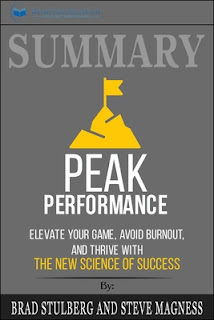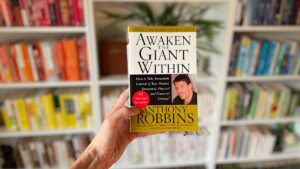Peak Performance Summar
Tag Line : Peak Performance shows you how to perform at your highest level by exploring the most significant factors that contribute to delivering our best work, such as stress, rest, focus, and purpose.
In 2003, an 18-year-old student-athlete accomplished the staggering feat of completing the mile run in 4 minutes and 1 second, competing with top collegiate level athletes. This exceptional performance took no small effort. He sacrificed all of the regular habits most teenagers have in favor of early bedtimes and mornings, long practices, and strictly managing his day.
A few years later, another young man landed a job at the National Economic Council. He worked in a team that counseled the president of the United States on health care. Similar to the student-athlete, this young man also showed exceptional skills in his work. He ended up creating a working model for the effect of health-care reforms on the United States economy. Many of his friends wondered if he would someday become the president of the United States himself.
If these stories sound like those of incredible people with extraordinary skills, that’s because they are. Unfortunately, both these strides ended in severe burnouts not long after these unbelievable feats. How do I know? Because these are the stories of the authors of Peak Performance, Brad Stulberg and Steve Magness. Thankfully, they were curious enough to examine their own struggles, which led to this amazing book.
Here are 3 lessons I learned:
1. If people appear to get ahead more easily, they might be using performance-enhancing drugs, which have a high price.
2. Rest is just as beneficial for growth as stress, and, in fact, absolutely necessary.
3. Multitasking seems like it works but actually prevents peak performance.
Are you ready to achieve your own levels of peak performance? Let’s learn how!
Lesson 1: Performance-enhancing drugs work in the short term, but come at a great price.
After working 72 hours straight as an intern at Bank of America, Moritz Erhardt died. He is an extreme but, ultimately, one of many examples of how much we are pushed to overwork ourselves to compete. Burnout is real. Today, many people say they experience it frequently, if not constantly. And it’s only getting worse.
In the information age we live in, it’s easy to find resources that help us perform at peak levels. Unfortunately, however, this same connection gives us access to performance-enhancing drugs we wouldn’t otherwise have. About 30% of college students, for example, use Adderall, a drug originally designed to help people with ADHD focus. And yet, the Center For Disease Control estimates that only 6% of people actually suffer from ADHD.
While using performance-enhancing drugs is a symptom of people’s commitment to do whatever it takes to succeed, ultimately, it just leads to burnout.
However, there’s still hope for those of us who want to perform at peak levels but do so in a healthy, legal, and sustainable way.
Lesson 2: Rest is an often overlooked, but crucial component of peak performance.
Olympic runner and bronze medalist Deena Kastor has a rigorous training routine. One unexpected part of this routine is to sleep 10-12 hours every night. Kastor believes the real growth and formation of her ability to perform at her peak state don’t lie in the training itself, but in what happens in between training sessions.
Whenever you physically perform at high levels, your muscles break down. It’s when our muscles reform, however, that we actually gain strength. If we are constantly trying to train and perform, we never give our bodies the time they need to recover and rebuild the parts that have broken down.
The same is true for the brain and other components necessary for our success. What most of us don’t realize, however, is that this rebuilding process takes time, often more time than we initially assume. The next time you think you should be training when you are resting, think again. Recharging may be exactly what you need right now to keep building your strength.
Lesson 3: Quality and quantity of work suffer when we try to multitask, so we should only do one thing at a time.
Multitasking is connected to worsened long-term memory, a poor ability to filter information, and greater difficulty with pattern recognition. Multiple studies have shown that our ability to produce high quantities of high-quality work decreases rapidly when we think we are doing a lot, but are actually just multitasking.
How does it feel, for example, when someone you are talking to is on their phone? They might say they’re listening, but that’s often just as hard to believe as it is to pull off. In contrast, consider Dr. Bob Kocher, who is a professor at Stanford and venture capitalist. Despite his demanding jobs, Kocher still makes the effort to really be with the people around him. Imagine the effect you’d have on others if you stopped being distracted by your phone or email and gave them your full attention.
To understand the true power of single-tasking, look at K. Anders Ericsson’s study of violinists that led to the popular 10,000-hour rule. While all of the musicians in the study spent 50 hours practicing each week, only some went on to become international soloists. Ericsson found that these violinists were the ones that practiced to reach a single, focused goal, rather than multiple goals, during their 50 hours.
Final Words
Peak Performance is a marvelous book. It’s a life-altering perspective on the essential components of how to perform at our highest levels. The research is thorough, with plenty of case studies to express the principles you will need to deliver your own best performance. Books like this help break through all the confusion about what it really takes to be productive and achieve our full potential without burning ourselves out.








